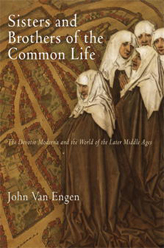
Around 600 years ago, a new kind of religious community emerged in the Low Countries: lay men and women moved into shared homes and dedicated their lives to prayer, work, and teaching.
Part of a movement known as devotio moderna, the “Sisters and Brothers of the Common Life” supported themselves, in part, by copying books. Each member also kept a personal spiritual diary, among other writings.
But because these households existed outside of a formal religious order, they caused great controversy and were shut down around 1560, says John Van Engen, Andrew V. Tackes Professor of History at Notre Dame.
The manuscripts the sisters and brothers produced were scattered, some lost forever.
Revealing History
Over the past 20 years, Van Engen has worked diligently to find and study an enormous number of the writings that came from these religious communities.

In 2008, he published some of his research in the book Sisters and Brothers of the Common Life: The Devotio Moderna and the World of the Later Middle Ages, which won the John Gilmary Shea and Philip Schaff prizes in 2009, as well as the Otto Gründler Book Prize in 2010.
Now, in July of this year, he is launching an ambitious project to publish the sisters’ and brothers’ writings in critical editions that include both Latin text and English translation.
Van Engen, who served as director of Notre Dame’s Medieval Institute from 1986 to 1998, says the project will enhance the University’s research profile and further promote it as a home to one of the nation’s top medieval programs.
“On the whole, people are not doing this kind of work anymore,” he says. “I think it gives us a distinctive quality—and gives our students the kind of skill level that it’s really important to develop.”
Funded through a $100,000 grant from the University, the three-year project will include four post-doctoral fellows. As Van Engen recalls, he was in Europe on a Guggenheim fellowship when he first became interested in tracking down these devotio moderna texts.
“It was the historian in me, digging and finding texts and then finding more texts and trying to figure out how they related,” he says. “And then at a certain point I thought—well this all needs to be put out there so that the next generations of historians can read it.”
Sharing Scholarship
The manuscripts Van Engen has gathered include both published and unpublished texts that fall into seven broad genres: "Lives" (Vitae), "Letters" (Epistolae), "Exercises" (Exercitia et proposita), "Sayings" (Dicta), "Customaries" (Consuetudines), "Defenses" (Apologiae), and "Privileges" (Privilegia et consilia), Van Engen says.
For the next three years, Van Engen and his team will work on the “Lives” and “Letters.” The 29 Lives are memorials written upon the death of a brother or sister, while the letters show the often difficult realities the brothers and sisters experienced.
None of these texts currently exist in critical editions, Van Engen says, but one goal of the project is to make them available in a searchable format online, as well as in published form, with facing Latin text and English translation.
After this first phase, Van Engen plans to continue the project with the remaining genres. He estimates that when complete, the works will form at least 10 volumes.
Such an extensive project would not be possible without assistance, Van Engen says. While joint credit will be given for the project on curriculum vitae, the post-doctoral fellows will be listed first for their work.
“I want them to learn from it,” he says. “And I don’t need credit anymore. I’m more concerned about getting this out there for scholars.”
Learn More >
- John Van Engen faculty page
- Related story: Historian John Van Engen Awarded 2011 Berlin Prize
- Related story: History Professor’s Book Wins Three Major Prizes